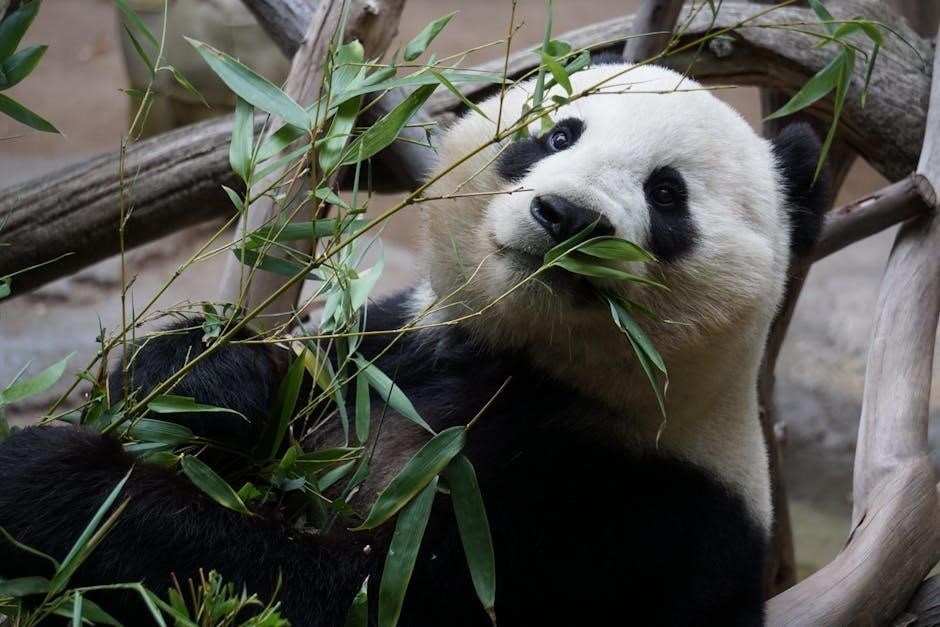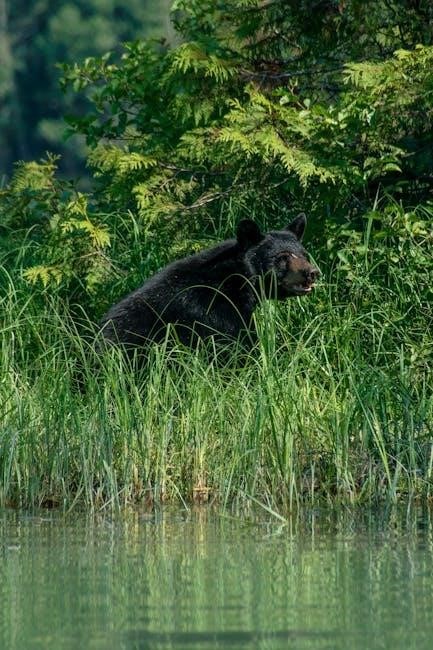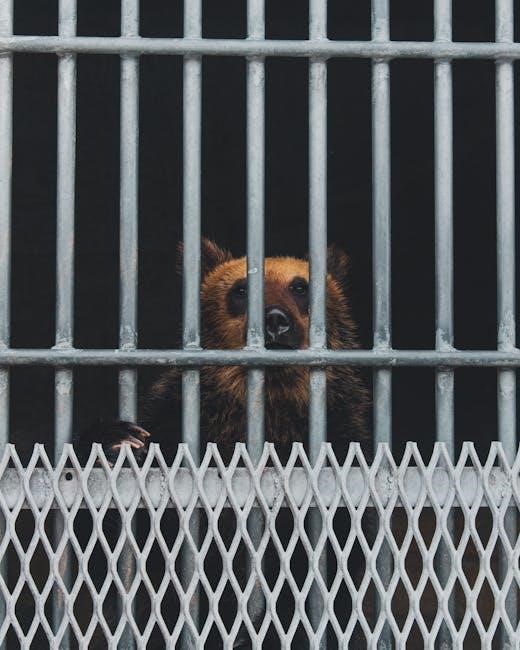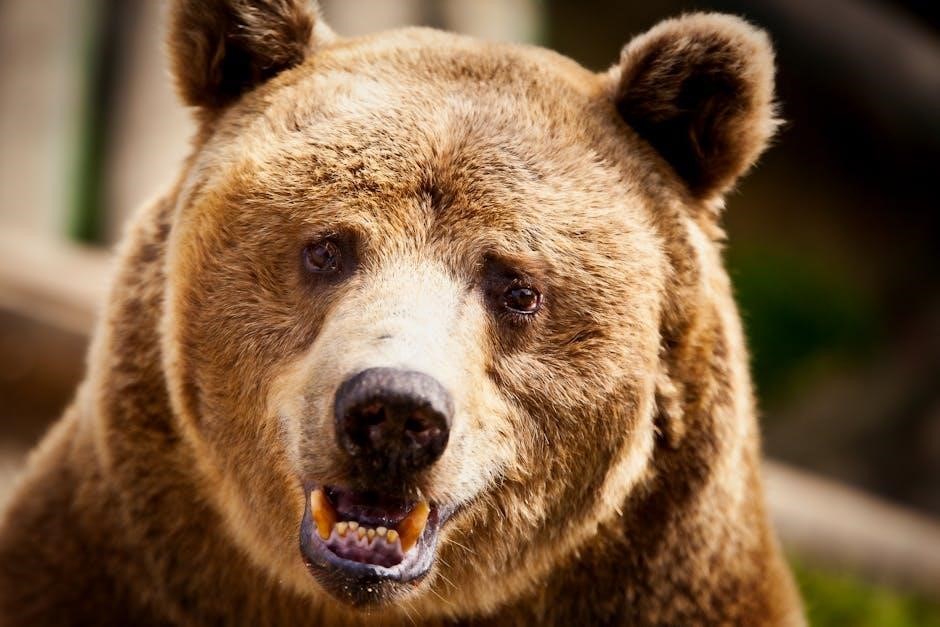“The Bear” by William Faulkner is a cornerstone of his literary oeuvre‚ blending intricate narrative techniques with rich symbolism․ The story explores themes of man vs․ nature‚ the decline of the Old South‚ and moral reflections‚ challenging readers to confront the complexities of human existence and the natural world․

Publication History of “The Bear”
“The Bear” first appeared in The Saturday Evening Post on May 9‚ 1942‚ before being expanded and included in Faulkner’s Go Down‚ Moses later that year․ An abbreviated version was later featured in his 1955 anthology‚ Big Woods․
Initial Publication in The Saturday Evening Post
“The Bear” first appeared in The Saturday Evening Post on May 9‚ 1942․ This publication marked Faulkner’s exploration of themes like nature and Southern heritage․ The story introduced readers to Old Ben‚ the elusive bear‚ and Isaac McCaslin’s transformative journey․ The Post’s platform allowed Faulkner to reach a broad audience‚ showcasing his unique literary style․ This initial version laid the groundwork for the story’s inclusion in Go Down‚ Moses‚ solidifying its place in Faulkner’s body of work․
Inclusion in Go Down‚ Moses
“The Bear” was later expanded and included in William Faulkner’s 1942 collection Go Down‚ Moses․ This book‚ often considered a novel‚ weaves together interconnected stories exploring themes of family‚ history‚ and the American South․ Faulkner’s decision to integrate “The Bear” into this collection allowed for deeper thematic connections‚ particularly in its examination of Southern identity and moral decay․ The story’s presence in Go Down‚ Moses underscores its significance within Faulkner’s broader literary vision‚ offering readers a richer understanding of his narrative genius․
Plot Summary of “The Bear”
“The Bear” follows Isaac McCaslin’s journey during annual hunts for the mythical bear Old Ben․ The story explores Ike’s evolving relationship with nature and his moral awakening․
Setting: The Big Woods
The story unfolds in the Big Woods‚ a vast‚ primeval forest in Mississippi․ This setting symbolizes the untamed wilderness‚ contrasting with human civilization․ The woods are a place of mystery and challenge‚ where the annual bear hunt occurs․ Faulkner’s vivid descriptions create an atmosphere of awe and reverence for nature․ The Big Woods serves as both a physical and metaphorical backdrop‚ highlighting themes of man vs․ nature and the search for meaning․ Its enduring presence underscores the timelessness of the natural world․

Characters: Isaac McCaslin and Old Ben
Isaac McCaslin‚ often called Ike‚ is the protagonist of “The Bear․” His journey from boyhood to adulthood is deeply intertwined with the annual hunt for Old Ben‚ a majestic and elusive bear․ Ike’s transformation reflects his growing moral awareness and connection to nature․ Old Ben‚ the mythical bear‚ embodies the primal power of the wilderness․ Their relationship symbolizes the clash and coexistence between humanity and nature․ Faulkner portrays Ike’s respect for Old Ben as a reflection of his broader philosophical contemplation of life‚ ethics‚ and the human condition‚ making both characters central to the story’s emotional and symbolic depth․
Plot Overview: The Hunt for the Mythical Bear
The story centers around the annual hunting expedition for Old Ben‚ a legendary bear in the Mississippi wilderness․ Over years‚ hunters attempt to capture or kill Old Ben‚ but he remains elusive‚ symbolizing the unconquerable natural world․ Isaac McCaslin’s involvement in these hunts evolves from youthful excitement to a deeper‚ philosophical understanding․ The narrative unfolds non-linearly‚ blending past and present as Ike grapples with the ethical implications of the hunt․ The pursuit of Old Ben becomes a metaphor for humanity’s relationship with nature‚ highlighting themes of respect‚ preservation‚ and the futility of human dominance over the wild․

Themes in “The Bear”
Man vs․ Nature‚ the decline of the Old South‚ and moral reflections are central themes․ Faulkner explores humanity’s clash with the wilderness‚ societal decay‚ and existential introspection through Ike’s journey․
Man vs․ Nature
Man vs․ Nature is a profound theme in “The Bear‚” where Faulkner contrasts humanity’s attempts to dominate the wilderness with nature’s indomitable spirit․ Through Ike’s evolving perspective‚ the story highlights the futility of human control over the natural world․ The bear‚ Old Ben‚ symbolizes the untamed and sacred essence of nature‚ while the hunters represent human ambition and fragility․ Faulkner’s portrayal underscores the idea that true harmony with nature requires humility and respect rather than conquest‚ reflecting Ike’s eventual rejection of materialism for a deeper spiritual connection with the land․

The Decline of the Old South
The Decline of the Old South is a central theme in “The Bear‚” reflecting Faulkner’s exploration of a fading era․ The story portrays the disintegration of traditional Southern values and the loss of a once-dominant way of life․ Through Isaac McCaslin’s journey‚ Faulkner examines the moral and cultural decay of the South‚ highlighting the tension between progress and preservation․ The diminishing big woods and the elusive bear symbolize the irreversible passage of time and the erosion of a bygone era‚ underscoring the inevitability of change and the clash between old and new․
Moral and Philosophical Reflections
Moral and Philosophical Reflections in “The Bear” delve into profound existential questions․ Faulkner uses the hunt for Old Ben to explore themes of humanity’s relationship with nature and the search for meaning․ Isaac McCaslin’s introspection reveals a deep moral struggle‚ questioning the ethics of hunting and the exploitation of the wilderness․ The narrative provokes contemplation on the balance between human ambition and the untamed natural world‚ urging readers to reflect on their place within the larger cosmic order and the ethical implications of their actions․

Symbolism in “The Bear”
Symbolism in Faulkner’s “The Bear” is profound‚ with Old Ben representing nature’s unconquerable spirit and the Big Woods embodying the untamed wilderness․ Lion‚ the dog‚ symbolizes loyalty and instinct․
The Bear (Old Ben) as a Symbol

Old Ben‚ the mythical bear‚ symbolizes the untamed power of nature and the futility of human attempts to conquer it․ His elusiveness and resilience represent the enduring spirit of the wilderness‚ challenging hunters’ efforts to dominate․ The bear’s eventual death marks the end of an era‚ reflecting the decline of the Old South and the encroachment of modernity․ Through Old Ben‚ Faulkner explores themes of coexistence and the moral complexities of humanity’s relationship with nature‚ making the bear a central‚ symbolic figure in the narrative․
Lion‚ the Dog: A Symbol of Loyalty and Instinct
Lion‚ the wild dog‚ embodies unwavering loyalty and primal instinct‚ serving as a bridge between humanity and nature․ His relentless pursuit of Old Ben highlights his innate drive‚ contrasting with the hunters’ increasingly civilized methods․ Lion’s death alongside the bear symbolizes the inevitable cost of confronting the wild‚ underscoring themes of sacrifice and the indomitable spirit of the natural world․ Through Lion’s character‚ Faulkner underscores the tension between instinct and reason‚ enriching the narrative’s exploration of man’s place within the wilderness․
The Big Woods: A Symbol of the Unconquerable Wilderness
The Big Woods in Faulkner’s “The Bear” represent a primordial‚ untamed realm that defies human dominion․ This vast‚ mysterious forest is not merely a setting but a living entity‚ embodying the enduring power of nature․ The woods challenge the hunters’ attempts to impose order‚ symbolizing the futility of human efforts to conquer the wild․ Through the Big Woods‚ Faulkner explores themes of humility‚ resilience‚ and the limits of human understanding‚ evoking a sense of awe and reverence for the natural world’s ineffable essence․

Character Analysis
Isaac McCaslin and Old Ben are central figures‚ embodying the clash between humanity and nature․ Ike’s journey reflects moral growth‚ while Old Ben symbolizes the wild’s indomitable spirit․
Isaac McCaslin (Ike): The Protagonist’s Journey
Isaac McCaslin‚ known as Ike‚ is the protagonist of “The Bear‚” whose journey is deeply intertwined with the mythical bear‚ Old Ben․ Ike’s character evolves from a young boy captivated by the stories of the bear to a man grappling with the moral complexities of hunting and the natural world․ His relationship with Old Ben symbolizes man’s connection to nature‚ as he learns to respect and coexist with the wilderness․ Through his experiences‚ Ike transitions from innocence to wisdom‚ embracing a deeper understanding of life‚ death‚ and the balance between humanity and the environment․
Old Ben: The Mythical Bear as a Central Figure
Old Ben‚ the elusive bear‚ is a central symbol in Faulkner’s “The Bear‚” embodying the untamed power of nature and the elusiveness of myth․ The bear’s presence dominates the narrative‚ shaping the hunters’ lives and their collective identity․ Through Old Ben’s characterization‚ Faulkner explores themes of resilience‚ survival‚ and the indomitable spirit of the wilderness․ The bear’s legend transcends reality‚ becoming a symbol of the unconquerable‚ challenging the hunters’ perceptions of nature and themselves․ Old Ben’s enduring presence underscores the fragility of human endeavors against the vast‚ unyielding natural world․

Faulkner’s Writing Style
Faulkner’s writing in “The Bear” is characterized by complex narrative techniques‚ dense language‚ and philosophical depth․ His non-linear storytelling and stream-of-consciousness style create a multi-layered‚ immersive experience․
Narrative Techniques: Non-Linear Storytelling
Faulkner employs a non-linear narrative in “The Bear”‚ weaving together multiple timelines that span generations․ The story unfolds through fragmented memories‚ blending past and present‚ creating a layered‚ complex structure․ This technique mirrors the cyclical nature of time and the futility of human efforts to conquer the wilderness․ By shifting perspectives‚ Faulkner builds suspense and deepens the philosophical undertones‚ immersing readers in the world of Isaac McCaslin and Old Ben․ The non-linear approach reflects Faulkner’s exploration of memory‚ history‚ and the enduring clash between humanity and nature․
Language and Style: Complexity and Depth
Faulkner’s language in “The Bear” is renowned for its complexity and depth‚ characterized by dense‚ layered prose․ His use of long‚ winding sentences and multiple narrative layers creates a rich‚ immersive experience․ Faulkner blends poetic imagery with philosophical musings‚ reflecting the story’s themes of nature‚ morality‚ and history․ The text challenges readers with its non-linear structure and stream-of-consciousness passages‚ yet rewards close attention with profound insights․ This stylistic complexity underscores the novella’s exploration of human and natural worlds‚ making it a masterpiece of literary depth and innovation․ Faulkner’s unique voice elevates the narrative to a meditative‚ almost mythical plane․
Cultural Significance

“The Bear” holds profound cultural significance‚ reflecting the American South’s history and its complex relationship with nature․ It explores themes of identity‚ morality‚ and heritage‚ resonating deeply with Faulkner’s regional and philosophical concerns․
Historical Context: The American South
William Faulkner’s “The Bear” is deeply rooted in the historical landscape of the American South‚ particularly the post-bellum era․ The story reflects the region’s complex relationship with nature‚ identity‚ and the lingering remnants of a fading agrarian society․ Set against the backdrop of the Big Woods‚ Faulkner explores themes of decline and moral reckoning‚ echoing the South’s struggle with its past․ The novella critiques the exploitation of land and labor‚ while also celebrating the resilience of the wilderness․ Faulkner’s portrayal of the South is both a lament for its lost grandeur and a meditation on its unresolved contradictions․
Place in Faulkner’s Body of Work
“The Bear” holds a significant place in Faulkner’s literary canon‚ serving as a bridge between his earlier and later works․ It was first published in The Saturday Evening Post and later expanded as part of Go Down‚ Moses‚ a collection that solidified his reputation as a master of Southern literature․ The novella’s themes of moral decay‚ human struggle‚ and the clash between tradition and progress resonate across Faulkner’s oeuvre‚ making it a pivotal piece in understanding his exploration of the American South’s cultural and historical identity․
“The Bear” by William Faulkner stands as a profound exploration of humanity’s relationship with nature and its own moral complexities․ Through the tale of Isaac McCaslin and the elusive Old Ben‚ Faulkner crafts a narrative that transcends time‚ blending myth with reality․ The story’s layered themes of guilt‚ redemption‚ and the futility of human ambition resonate deeply‚ offering readers a reflection on the fragility of existence․ Faulkner’s masterful prose and philosophical depth ensure that The Bear remains a timeless work‚ enduring as a testament to his literary genius and his unwavering exploration of the human condition․